Nursing, Ethics, and Legal Experts Collaborate to Bring CCP’s Forced Organ Harvesting Into the Spotlight
Inaugural Nurses Summit on Combatting and Preventing Forced Organ Harvesting informs and invigorates nursing professionalsThe very first summit of nursing professionals countering the crime of forced organ harvesting was held online on Nov. 1. The Nurses Summit on Combatting and Preventing Forced Organ Harvesting was jointly organized by the Academy of Forensic Nursing (AFN) and Doctors Against Forced Organ Harvesting (DAFOH). DAFOH is an international NGO founded by medical doctors dedicated to informing the public about forced organ harvesting since 2006. AFN is a professional nursing organization whose mission is to advance care to those whose lives have been impacted by violence. “[AFN] has partnered with [DAFOH] because we share a united vision to protect and promote ethical, medical, and nursing practices worldwide,” AFN President Jennifer Johnson said at the Nurses Summit. “It is critical for all health care professionals to be aware of forced organ harvesting.” Kathleen Thimsen, co-founder of AFN and associate professor of nursing at the University of Nevada in Las Vegas, served as the moderator of a panel of ten leading experts in nursing, forensics, ethics, human rights, law, and journalism. Kathleen Thimsen, co-founder of AFN and moderator of the Nurses Summit on Combatting and Preventing Forced Organ Harvesting, speaks to the panel of experts on Nov. 1, 2022. (Courtesy of DAFOH) The panel also included two witnesses from China, one of whom survived inhumane torture in a Chinese labor camp and the other who lost her father presumably due to forced organ harvesting. Deborah Collins-Perrica, director of nursing affairs at DAFOH and host of the Nurses Summit, told The Epoch Times: “Through the summit, we aim to inform and inspire nurses and the public. The seemingly ‘far away’ problem of the Chinese regime’s forced organ harvesting is very much ‘close to home,’ and we as nurses have the knowledge and responsibility to stand up against it.” A ‘Billion Dollar’ Industry Collins-Perrica provided a comprehensive background for understanding forced organ harvesting, a human rights violation that obtains organs from living people without consent. “In China, the practice [of forced organ harvesting] is approved and sponsored by the government … managed by the police and with military oversight.” Collins-Perrica said that with organ tourism, China’s organ transplant trade has become “one of the world’s most profitable” industries, generating a billion dollars a year for the regime. Deborah Collins-Perrica, director of nursing affairs at DAFOH and host of the Nurses Summit on Combatting and Preventing Forced Organ Harvesting, on Nov. 1, 2022. (Courtesy of DAFOH) Furthermore, Collins-Perrica quoted the China Tribunal, an independent London-based tribunal, whose investigation confirmed that persecuted Falun Gong practitioners have been a primary organ source. “I am a psychiatric nurse of 30 years,” said Collins-Perrica. “When it comes to forced organ harvesting, after hearing about this, meeting victims, and hearing their stories, I am an activist … I cannot be silent.” She encourages her colleagues to do what they can to inform, educate, and stop this crime against humanity. Nurses Are ‘A Critical Linchpin’ of Medical Ethics Ethan Gutmann, an investigative journalist who spent years traveling the world interviewing survivors of Chinese labor camps and prisons, writes extensively about China’s decades-long practice of forced organ harvesting. Investigative journalist Ethan Gutmann at the Nurses Summit on Combatting and Preventing Forced Organ Harvesting on Nov. 1, 2022. (Courtesy of DAFOH) In his speech, Gutmann outlined the history of the Chinese Communist Party’s (CCP) organ harvesting, which has expanded to the Uyghurs in China’s northwestern Xinjiang Province and possibly other victim groups. Talking about the CCP’s recent transplant and donation system reform, which has been touted by some Western doctors, Gutmann said it “includes semantic tricks and it had voluntary donation numbers based on an equation.” Gutmann referred to a peer-reviewed paper published in BMC Medical Ethics that showed China’s official organ donation numbers were based on a single equation that produces a parabolic curve. “This was and is a human rights catastrophe. It was created by Beijing,” said Gutmann, “but it was continuously enabled by a handful of western surgeons who thought they could ride the Chinese dragon and come back home as if everything was okay.” “Nursing is clearly the heart of western medical culture … The live organ harvesting of political and religious dissidents goes against every aspect of [the nursing] oath and that code of ethics,” he said. “By your presence here, by considering what I and so many other researchers have established, by considering collective action in any form, you become a critical linchpin.” Gutmann offered some suggestions for what nurses can do: “You don’t have to
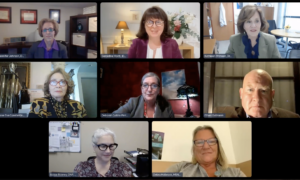
Inaugural Nurses Summit on Combatting and Preventing Forced Organ Harvesting informs and invigorates nursing professionals
The very first summit of nursing professionals countering the crime of forced organ harvesting was held online on Nov. 1. The Nurses Summit on Combatting and Preventing Forced Organ Harvesting was jointly organized by the Academy of Forensic Nursing (AFN) and Doctors Against Forced Organ Harvesting (DAFOH).
DAFOH is an international NGO founded by medical doctors dedicated to informing the public about forced organ harvesting since 2006. AFN is a professional nursing organization whose mission is to advance care to those whose lives have been impacted by violence.
“[AFN] has partnered with [DAFOH] because we share a united vision to protect and promote ethical, medical, and nursing practices worldwide,” AFN President Jennifer Johnson said at the Nurses Summit. “It is critical for all health care professionals to be aware of forced organ harvesting.”
Kathleen Thimsen, co-founder of AFN and associate professor of nursing at the University of Nevada in Las Vegas, served as the moderator of a panel of ten leading experts in nursing, forensics, ethics, human rights, law, and journalism.
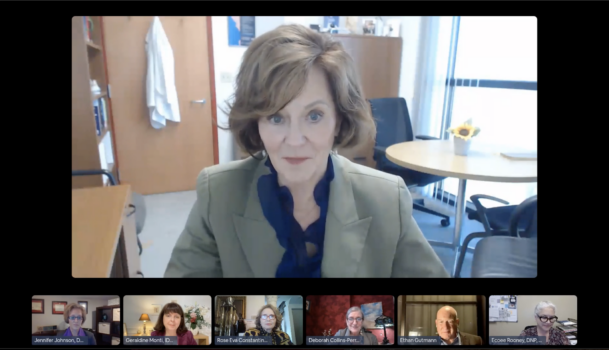
The panel also included two witnesses from China, one of whom survived inhumane torture in a Chinese labor camp and the other who lost her father presumably due to forced organ harvesting.
Deborah Collins-Perrica, director of nursing affairs at DAFOH and host of the Nurses Summit, told The Epoch Times: “Through the summit, we aim to inform and inspire nurses and the public. The seemingly ‘far away’ problem of the Chinese regime’s forced organ harvesting is very much ‘close to home,’ and we as nurses have the knowledge and responsibility to stand up against it.”
A ‘Billion Dollar’ Industry
Collins-Perrica provided a comprehensive background for understanding forced organ harvesting, a human rights violation that obtains organs from living people without consent.
“In China, the practice [of forced organ harvesting] is approved and sponsored by the government … managed by the police and with military oversight.” Collins-Perrica said that with organ tourism, China’s organ transplant trade has become “one of the world’s most profitable” industries, generating a billion dollars a year for the regime.
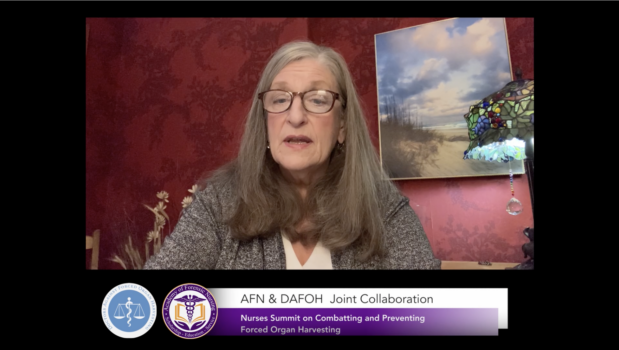
Furthermore, Collins-Perrica quoted the China Tribunal, an independent London-based tribunal, whose investigation confirmed that persecuted Falun Gong practitioners have been a primary organ source.
“I am a psychiatric nurse of 30 years,” said Collins-Perrica. “When it comes to forced organ harvesting, after hearing about this, meeting victims, and hearing their stories, I am an activist … I cannot be silent.” She encourages her colleagues to do what they can to inform, educate, and stop this crime against humanity.
Nurses Are ‘A Critical Linchpin’ of Medical Ethics
Ethan Gutmann, an investigative journalist who spent years traveling the world interviewing survivors of Chinese labor camps and prisons, writes extensively about China’s decades-long practice of forced organ harvesting.
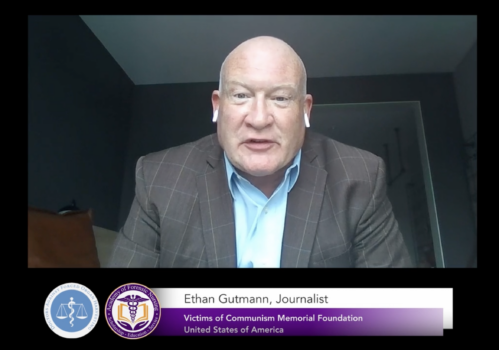
In his speech, Gutmann outlined the history of the Chinese Communist Party’s (CCP) organ harvesting, which has expanded to the Uyghurs in China’s northwestern Xinjiang Province and possibly other victim groups. Talking about the CCP’s recent transplant and donation system reform, which has been touted by some Western doctors, Gutmann said it “includes semantic tricks and it had voluntary donation numbers based on an equation.”
Gutmann referred to a peer-reviewed paper published in BMC Medical Ethics that showed China’s official organ donation numbers were based on a single equation that produces a parabolic curve.
“This was and is a human rights catastrophe. It was created by Beijing,” said Gutmann, “but it was continuously enabled by a handful of western surgeons who thought they could ride the Chinese dragon and come back home as if everything was okay.”
“Nursing is clearly the heart of western medical culture … The live organ harvesting of political and religious dissidents goes against every aspect of [the nursing] oath and that code of ethics,” he said.
“By your presence here, by considering what I and so many other researchers have established, by considering collective action in any form, you become a critical linchpin.”
Gutmann offered some suggestions for what nurses can do: “You don’t have to invent anything new here, the precedent is clear: abolish all western contact with the mainland Chinese transplant industry; no Chinese transplant surgeons or nurses, for that matter, in our medical journals, our universities, our conferences, and our hospitals; and a freeze on all sales of surgical equipment, pharmaceutical development, and testing in China.”
‘Major Issues in China’ With Ethics
Arthur Caplan is the Mitty Professor of Bioethics and founding head of the Division of Medical Ethics at NYU Grossman School of Medicine in New York City. Prior to NYU, Caplan founded the Center for Bioethics and the Department of Medical Ethics at the University of Pennsylvania. He also served as a co-chair of a major United Nations and European Union task force on organ trafficking.
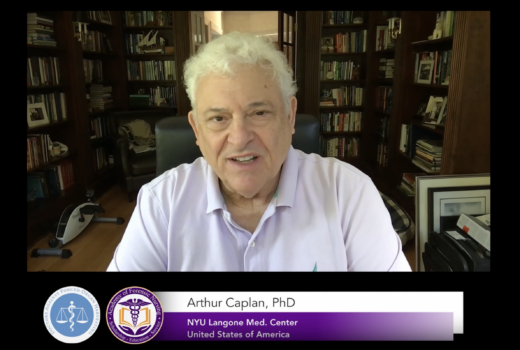
Caplan started his speech by defining the three pillars of the moral framework of organ transplant, namely the dead donor rule, altruistic donation, and fair distribution of the organs.
“Sad to say, I still believe that there are major issues” in China, Caplan said. “There is a huge gap between how many transplants China says it does every year and what they report for figures for organ donation.”
Caplan said that to get organs, the Chinese regime turns to its prisoners, who could range from political prisoners to Falun Gong practitioners, or those in a certain ethnic group—people who may be “inappropriately imprisoned.”
“I think nurses have a special obligation to be wary of what’s going on in China right now in transplants, still, to try and bring pressure on the government to improve and modify practices that especially involve prisoners, to try and also protest if information is put into journals … that comes from China about transplantion, unless it is clear what the providence is of the organs that are being reported on,” he said.
“And we should not be recommending to patients that they go to China in order to get a transplant.”
‘Keeping Patients Fully Informed’
On the topic of ethics, Ecoee Rooney, president of the Louisiana State Nurses Association and the chair of the ethics committee of AFN, talked about the ethical considerations of organ procurement.
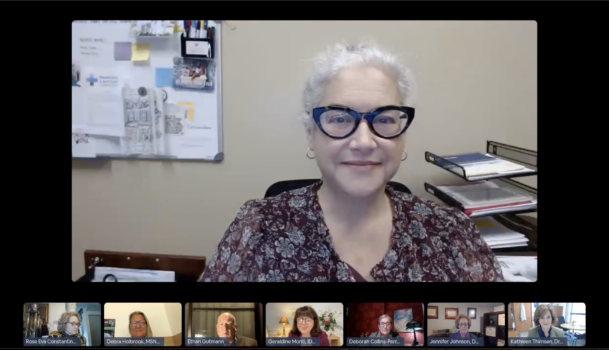
Rooney iterated the importance of keeping the patients informed.
As health care providers, “it is our obligation to help [our patients] understand the potential risks and benefits of any decision they make as it relates to health care. … So along the lines of what we’ve been talking about today, keeping patients fully informed about the realities that happen in China currently as it relates to transplantation … would be enough to provide some clarity around that decision. Certainly, that is one of the things that, as nurses, we are bound to do is to ensure that the people that we serve are clear and informed on the decisions that they are making,” she said.
A Great Way to Educate Our Students
Rose Constantino has been teaching at the University of Pittsburgh School of Nursing since 1971, with rich experiences in ethical and legal issues in nursing practice. She talked about international organ trafficking and forced organ harvesting. She urges the scientific community to reject publications from countries with practices of organ trafficking and harvesting.
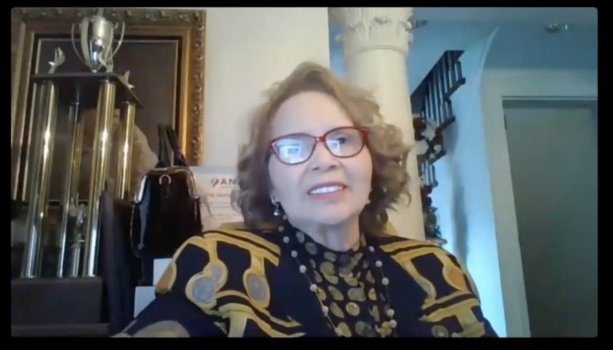
In addition, Constantino thinks that the summit could be a good way to educate the students. The four-hour seminar is the best way to really understand the problem, she said. If there could be this kind of seminar “directed to all students, that would be a very big way, … of educating students in this way. Because no one has really heard or even seen what we have seen today.”
Global Legislative Campaign
Theresa Chu, a human rights lawyer based in Taiwan, talked about the Universal Declaration on Combating and Preventing Forced Organ Harvesting (UDCPFOH), of which Chu serves as the chair of the steering committee. The UDCPFOH was jointly launched in 2021 by five NGOs, including DAFOH in the United States and others in Europe, Taiwan, South Korea, and Japan.
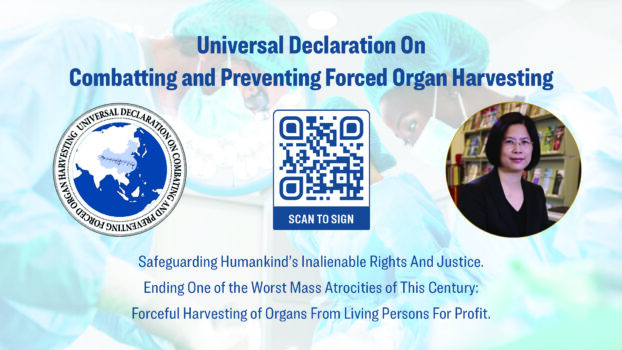
The Universal Declaration urges the world to safeguard humankind’s inalienable rights, to maintain the highest values of justice, and to end one of the most egregious atrocities of this century: forced organ harvesting from living persons—without consent and for profit.
“We are currently promoting a Combating and Preventing Forced Organ Harvesting legislative campaign across Europe, America, and Asia to severely punish and prevent the atrocities of forced organ harvesting through the criminal laws of various countries,” said Chu, who has worked to defend Falun Gong victims for 20 years.
Through legislation, Taiwan has led the world in protecting its citizens from becoming complicit in the crime of forced organ harvesting. Since 2015, Taiwan has made it mandatory for patients going abroad for transplant to register the country, hospital, and doctor involved, or be stripped of insurance coverage for anti-rejection drugs. Taiwan also maintains a blacklist of mainland Chinese surgeons involved in organ harvesting to bar them from entering Taiwan.
Chu welcomes nursing professionals to sign the Declaration.
“[AFN] is committed to support the Universal Declaration,” said AFN president Johnson. “We know that forced organ harvesting is a human rights violation, and the elements at work are force, fraud, coercion, and even abduction.”
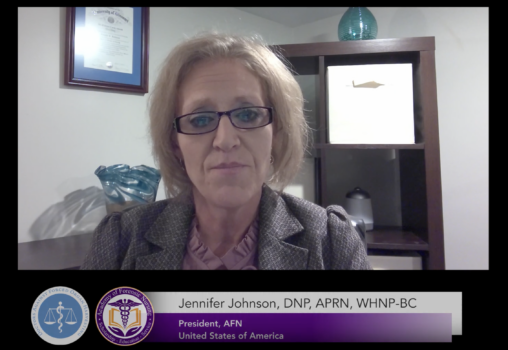
Debra Holbrook, president-elect of AFN and director of forensic nursing at Mercy Medical Center in Baltimore, Maryland, said, “The practice of forced organ harvesting is a form of human trafficking in its most egregious form, and we as forensic nurses have not only the responsibility, but also the obligation, to support all efforts to abolish these acts, no matter where they’re being performed.”
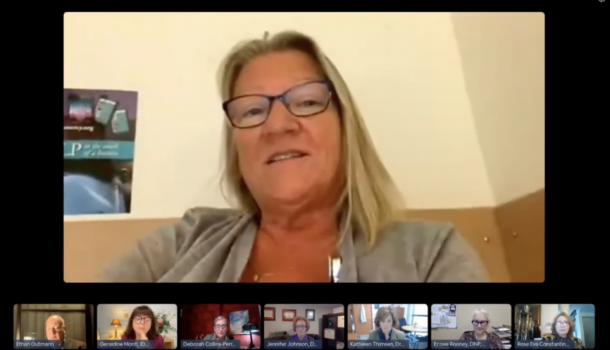
Holbrook said that she would like to challenge AFN to make a “task force of people—nurses, doctors, ethicists—who really want to address [forced organ harvesting] in the legal arena. And we bring our voices together, and we bring all the education that [DAFOH] has done in awareness.”
“We come together to maybe draft or to recruit some legislators in the United States, and they will help us work on drafting that legislation. So I would love to be part of that group,” she said, encouraging viewers and others to go to AFN.
Personal Experiences Shared
Two Falun Gong practitioners from China also spoke about their experiences in Chinese labor camps and prisons, including about the torture, frequent blood tests, and medical exams targeting practitioners. The father of one of the practitioners died in prison due to the persecution. She talked about how her family was not allowed to have a full examination of her father’s body and how they had suspected that his organs were harvested.
Falun Gong is a mind-body practice with moral teachings centered on truthfulness, compassion, and forbearance. The practice became very popular in China, with over 70 million adherents in 1999, according to official Chinese data. The Chinese Communist Party (CCP), however, considered Falun Gong’s popularity a threat and launched a brutal persecution that is still going on today. Millions of Falun Gong adherents have likely been incarcerated. While subjected to torture and forced labor, they have unwillingly become the “donor bank” that has fueled China’s billion-dollar transplant industry.
A Road Map of Actions
The summit concluded after a Q&A session, where questions related to forced organ harvesting were discussed. “The summit gave us a road map of actions we can now take, especially in the areas of education and law,” Collins-Perrica told The Epoch Times. “This is the first time nurses and doctors have publicly collaborated on the issue of forced organ harvesting. We have a unified vision to see it promptly end, and we look forward to working together.”
After attending the summit, a nurse from Virginia wrote, “The Nurse Summit to CPFOH [Combatting and Preventing Forced Organ Harvesting] was very good, the speakers were great. Seeing the survivors of persecution in China speak really made this personal for me.”
Another audience member wrote, “thank you to all the speakers for bringing awareness to the crimes of FOH. We appreciate your courage and perseverance.”













